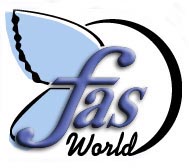First International FASDAY
September 9, 1999

In
One Magic Minute, We Changed the World: 1999/9/9 9:09 am
"Trust your crazy ideas," says a sign on Bonnie Buxton’s bulletin board. Along with her husband, Brian Philcox, and Teresa Kellerman, Buxton came up with the idea of International Fetal Alcohol Syndrome Awareness Day in early 1999.
Buxton, Philcox, and Kellerman are parents of children with Fetal Alcohol
Spectrum Disorders (FASD), a group of disabilities caused by maternal drinking
during pregnancy. FASD is now the
leading cause of mental retardation in western civilization, one which could be
totally prevented. FASD affects about 1 in 100 people in North America. (There
are about 3 million people with FASD in the U.S., and 300,000 in Canada, most
undiagnosed.) In Eastern Europe and countries of the former Soviet Union, the
rate of undiagnosed FASD may be higher.
The original
volunteers were mainly adoptive and foster parents, plus a small but committed
number of mothers in recovery, who have been working hard to inform and support
other women with substance abuse problems. All of them lived daily with children
whose prenatal damage caused mental retardation or learning disabilities, plus
severe acting-out behavior that disrupted their lives and their classrooms, and
often physical problems requiring much medical attention. For most of the
parents, life revolved around their children’s crises: most mothers had been
forced to abandon any thought of full-time career.
Frustrated by the lack of public awareness of FASD
by both public and professionals, they had sought help for their problems on the
online support group, Faslink, for two years or more. And on one winter morning
in January 1999, Buxton began to wonder:
When they were digging out their cars from the great Toronto snowstorm, Buxton said, “What if, on the 9th minute of the 9th hour of the 9th day of the 9th month of the year 1999, we asked the world to remember that during the 9 months of pregnancy, a woman should remain alcohol free? And, what if we also asked the world to remember those millions of people who will never fulfill their genetic potential, because of prenatal alcohol exposure? At this magic minute in history, could we begin to change the world?”
In late February of 1999, Bonnie and Brian traveled
to Arizona and talked Teresa into helping them begin this international movement,
and this small group of burned out parents set out to change
the world.
The three began to work on it right away, building alliances,
with only the help of the Internet. The group grew quickly to include about 70
volunteer coordinators in eight countries. The northernmost volunteers are in
Alaska, Yukon and Nunavut, the southernmost in New Zealand. There were FAS Day
proclamations issued in many cities and towns, and several U.S. states.
The first FAS Day began on September 9, 1999 in Auckland, New Zealand, where “Minute of Reflection” bells rang at 9:09 a.m., at Mt Albert Methodist church. Then it moved to Adelaide, Australia, and then to South Africa, where at 9:09 a.m., Cape Town volunteers gathered to hear the War Memorial Carillon that rang when Nelson Mandela was released from prison. Volunteers in Italy, Germany and Sweden held events – and then FASDay crossed the Atlantic. There were events in every time zone across Canada and the U.S., including ringing of carillons in Toronto, Niagara Falls, Hastings, NE, and Austin & San Antonio, Texas. The westernmost activity was the community breakfast on the tiny island of Kitkatla, B.C., near the Queen Charlotte Islands, where the village bell rang at 9:09 a.m. followed by prayers in the native tongue by village elders.
Over the years, the movement continues to grow: FASD Awareness Day activities are celebrated in England, France, Sweden, Germany, Madagascar, and the Netherlands, as well as every Province and State in North America. FASD Awareness Day is promoted by the National Organization of Fetal Alcohol Syndrome in Washington, D.C., as well as the Canadian and United States government health agencies. Learn more about FASD Awareness Day at www.fasday.com.